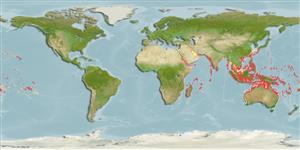Environment: milieu / climate zone / depth range / distribution range
Ecologia
marinhas associadas(os) a recifes; não migratória; intervalo de profundidade 0 - 55 m (Ref. 7247). Tropical; 32°N - 36°S, 24°E - 128°W
Indo-Pacific: Red Sea and East Africa to the Line and Pitcairn islands, north to southern Japan, south to Sydney, Australia. Not found in the Hawaiian and Marquesan islands.
Tamanho / Peso / Idade
Maturity: Lm ? range ? - ? cm
Max length : 14.0 cm TL macho/indeterminado; (Ref. 89972); peso máx. publicado: 45.21 g (Ref. 126022)
Descrição suscinta
Chaves de identificação | Morfologia | Morfometria
Espinhos dorsais (total) : 12; Raios dorsais (total) : 14 - 16; Espinhos anais: 2; Raios anais : 14 - 15. Juveniles overall black with scale centers bluish; white blotch on forehead and upper sides; all fins black except the transparent pectoral and outer portion of soft dorsal rays. Geographic and behavioral color of adults variable; no spot on forehead; spot on upper sides very reduced; head and fins normally black; scales with black margins. Margins of preorbital, suborbital and preoperculum finely serrated (Ref. 2746). Nuptial fish generally paler color. Body depth 1.4-1.6 in SL (Ref. 90102).
Adults inhabit coral and rocky reefs, juveniles often commensal with large sea anemones, sea urchins, or small coral heads (Ref. 4391, 48636). They occur in small to large aggregations. Stomach contents include algae, copepods, and other planktonic crustaceans (Ref. 7247). Oviparous, distinct pairing during breeding (Ref. 205). Eggs are demersal and adhere to the substrate (Ref. 205). Males guard and aerate the eggs (Ref. 205). Diurnal species (Ref. 54980; 120737). Minimum depth reported taken from Ref. 128797.
Ciclo de vida ou comportamento de acasalamento
Maturidade | Reprodução | Desova | Ovos | Fecundidade | Larvas
Oviparous, distinct pairing during breeding (Ref. 205). Eggs are demersal and adhere to the substrate (Ref. 205). Males guard and aerate the eggs (Ref. 205). Courtship characterized by male 'signal-jumping'. Captive pair reported to spawn thrice monthly with a total of 17 over a 7-month period (Ref. 2856). While protogyny was originally proposed for this species, recent studies confirmed gonochorism in the form of non-functional hermaphroditism (Ref. 103751).
Allen, G.R., 1991. Damselfishes of the world. Mergus Publishers, Melle, Germany. 271 p. (Ref. 7247)
Status na Lista Vermelha da UICN (Ref. 130435: Version 2024-2)
Ameaça para os humanos
Harmless
Uso pelos humanos
Pescarias: pouco comercial; Aquário: Espécies comerciais
Ferramentas
Relatórios especiais
Baixar XML
Fontes da internet
Estimates based on models
Preferred temperature (Ref.
123201): 24.6 - 29, mean 28 °C (based on 1240 cells).
Índice de diversidade filogenética (Ref.
82804): PD
50 = 0.5005 [Uniqueness, from 0.5 = low to 2.0 = high].
Bayesian length-weight: a=0.03467 (0.02169 - 0.05544), b=2.93 (2.80 - 3.06), in cm total length, based on LWR estimates for this species & (Sub)family-body (Ref.
93245).
Nível Trófico (Ref.
69278): 3.0 ±0.24 se; based on food items.
Resiliência (Ref.
120179): Elevada, tempo mínimo de duplicação da população menor que 15 meses (Fec=20,000-25,000).
Fishing Vulnerability (Ref.
59153): Low vulnerability (10 of 100).
Nutrients (Ref.
124155): Calcium = 90.3 [45.4, 146.6] mg/100g; Iron = 0.802 [0.476, 1.335] mg/100g; Protein = 18 [17, 19] %; Omega3 = 0.115 [0.067, 0.193] g/100g; Selenium = 27.9 [13.9, 57.3] μg/100g; VitaminA = 123 [33, 443] μg/100g; Zinc = 1.48 [0.97, 2.15] mg/100g (wet weight);
